Play all audios:
Rand Paul has thrown down the gauntlet. This week, the Kentucky Republican came out against President Trump's picks to run the State Department and the CIA, risking his occasional
golfing buddy's wrath. "I'm going to do everything I can to block them," the senator said of CIA Director Mike Pompeo, Trump's nominee for secretary of state, and
Gina Haspel, the president's selection to replace Pompeo. Paul argued that this is actually consistent with supporting Trump and his "America First" campaign promises.
SUBSCRIBE TO THE WEEK Escape your echo chamber. Get the facts behind the news, plus analysis from multiple perspectives. SUBSCRIBE & SAVE SIGN UP FOR THE WEEK'S FREE NEWSLETTERS
From our morning news briefing to a weekly Good News Newsletter, get the best of The Week delivered directly to your inbox. From our morning news briefing to a weekly Good News Newsletter,
get the best of The Week delivered directly to your inbox. Trump and Paul were the only major candidates in the 2016 Republican presidential primaries to admit without equivocation that the
Iraq War was a mistake and to consistently oppose future wars for regime change in the Middle East. Trump continues to argue in speeches that U.S. military intervention in that region has
largely left the country worse off, but from Afghanistan to Syria his policy choices have sent a different message. Paul is right that Pompeo is a fervent Iran hawk. And Haspel was involved
in a controversial Bush-era interrogation program that bled into torture. "It's galling to read of her glee during the waterboarding," Paul said. "It's absolutely
appalling." Paul has been a lonely voice crying in the wilderness on this for some time, opposing Pompeo for CIA director even when Democrats like Senate Minority Leader Chuck Schumer
were in favor and trying to start a debate on the bipartisan foreign policy consensus. But now, in a 51-49 Senate, Paul's vote could be decisive. This is especially true with John
McCain absent — and not sounding particularly sold on Haspel, who unlike Pompeo has never been vetted by the upper chamber and does not boast the same Capitol Hill relationships. Paul could
filibuster, as he has obviously done before when trying to raise awareness of drone strikes and extrajudicial killings. He could also lead to an unfavorable committee vote. During the
Republican primaries, Paul was always the better choice for antiwar conservatives and libertarians. He has since tried to keep the president true to his campaign commitments to rethink the
open-ended wars that never end well and only seem to help virulent strains of militant Islamism metastasize. At the moment, Trump is siding with the very neoconservatives and reflexive GOP
hawks who tried to upend his bid for the GOP nomination. There are even widespread rumors that John Bolton might become national security adviser, replacing H.R. McMaster. To put it mildly,
Bolton is no champion of foreign policy restraint. Without Trump, Paul and a few allies are left to battle Republicans who have learned nothing from the George W. Bush years virtually alone.
"Gina Haspel has spent her career defending the American people and homeland," Wyoming Rep. Liz Cheney, daughter of Bush's hawkish vice president, wrote on Twitter.
"[Paul] is defending and sympathizing with terrorists." Marrying that kind of simplistic thinking with Trumpian disregard for political and institutional norms is a prescription
for disaster. Paul shouldn't be fighting nearly alone, of course. Constitutional conservatives and sincere antiwar progressives should be siding with him against these baseless smears.
Indeed, anyone who would like to avoid continuing down America's long road to perpetual and unnecessary war have but one option: Stand with Rand.

